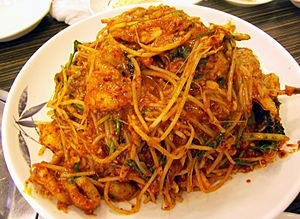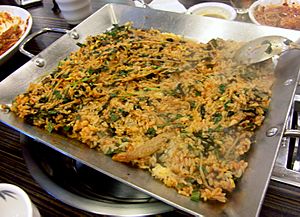Agwi-jjim facts for kids
 |
|
| Type | Jjim |
|---|---|
| Place of origin | Korea |
| Main ingredients | blackmouth angler |
| Korean name | |
| Hangul |
아귀찜
|
|---|---|
| Revised Romanization | agwijjim |
| McCune–Reischauer | agwitchim |
| IPA | [a.ɡɥi.t͈ɕim] |
| Gyeongsang dialect | |
| Hangul |
아구찜
|
| Revised Romanization | agujjim |
| McCune–Reischauer | agutchim |
| IPA | [a.ɡu.t͈ɕim] |
Agwi-jjim (아귀찜) or agu-jjim (아구찜) is a popular Korean dish. It's a type of jjim, which means a steamed or braised dish. The main ingredient is a fish called blackmouth angler, known as agwi in Korean. This dish is often called "braised spicy angler."
Agwi-jjim is famous for its spicy and hot flavor. It gets its kick from hot chili pepper powder. Other ingredients like doenjang (a Korean fermented soybean paste), ganjang (soy sauce), minced garlic, and chopped scallions are also added.
Besides the fish, other important ingredients give agujjim a fresh and pleasant taste. These include kongnamul (soybean sprouts), mideodeok (a type of sea squirt), and minari (water celery). The agwi fish itself is a great source of protein. It has a rich taste and a fun, chewy texture.
History of Agwi-jjim
The story of Agwi-jjim began in a fish market in Masan, a city in South Gyeongsang Province. Local fishermen would ask cooks at market eateries to make a tasty meal from the agwi fish. This fish was once considered ugly and not very valuable.
Before the 1940s, agwi fish was often thrown away because of its appearance and low market price. However, as other fish became harder to find in the late 20th century, this "ugly" fish became a popular and delicious meal.
Agujjim is still a special dish from Masan, especially in the Odong-dong area. In traditional Masan agujjim, the agwi fish is dried for 15 to 30 days before being seasoned. In other regions, fresh agwi is used after its insides are removed.
Where to Find Agwi-jjim
In Seoul, there are two famous streets known for agujjim. You can find them in Sinsa-dong and the Jongno district. This popular jjim dish is usually eaten with bowls of cooked rice.
Sometimes, after eating the main dish, restaurants will stir-fry the leftover sauce with rice and extra vegetables on the grill. This creates Bokkeumbap, a delicious fried rice dish with a crispy, charred bottom.
Agujjim is also a popular anju. An anju is a dish that is often eaten with drinks, like soju.

See also
 In Spanish: Agujjim para niños
In Spanish: Agujjim para niños
 | Toni Morrison |
 | Barack Obama |
 | Martin Luther King Jr. |
 | Ralph Bunche |

